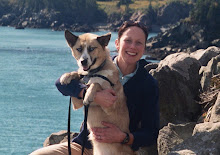It's the start of Fourth of July weekend, but in keeping with our agreement, there will be no independence for this little dog. Instead, we pack up her tie-down and lead line, suit her up in harness and leash, and then head back to the Penobscot River. As we set out, I joke that perhaps Brent will be able to work his rehabilitative magic on this inmate. If not, maybe he can lend Ari a tin cup to scrape across the bars of her jail cell. Greg gives me a tired look in return.
Still, even dealing with our delinquent dog can’t really dampen Greg’s spirits. We are on our way to join our friends Mike and Jean, along with their three-year-old daughter, Olivia, on the Penobscot. This time, we’ll be camping in the shadows of Katahdin, Maine’s highest mountain: a craggy, sleeping dinosaur with a slight curve it its spine and folds of granite running down each enormous flank. The five tribes comprising the Wabanaki Nation have long considered this mountain holy. Out of respect for this sacredness, they do not climb the mountain but, instead, conduct annual religious ceremonies at its base, paying tribute to Kathadin and its spirits.
For most visitors, however, Katahdin is far less a spiritual place than it is a mere cardiovascular challenge. The crown jewel of Maine’s Baxter Park, a 200,000 acre wilderness area, Katahdin sees thousands of tourists each year, making it one of the most popular recreation destinations in the area. Because the alpine landscape is so fragile, the park limits the number of permits it offers for hiking, camping, and climbing each year. They are awarded on a first-come, first-served basis beginning January 1st. Regardless of winter weather, dozens of intrepid hopefuls spend their New Year’s Eve camped out in front of the state park headquarters, awaiting a chance to summit the grand mountain or cast their flies and match wits with brook trout eight months later.
Today, the long line of vehicles crawling towards the park confirms that popularity. It also makes for very slow going. As Greg navigates the traffic and Ari sleeps in the back of the cab, I count cars and trucks. There are two distinct types of vehicles here: large trucks with ATVs, fishing poles, and gun racks; and sporty cars overflowing with kayaks, backpacks, and ‘Leave No Trace’ bumper stickers. Collectively, they represent the confluence of cultures that meet each summer here in the North Woods: conservationists and preservationists; conservatives and liberals. But for the most part, the politics of red and blue America blend smoothly here, creating what political pundits call a purple response to the environment.
I’m most interested in the history of outdoor recreation around Katahdin, and I consider this something of a literary pilgrimage. In 1846, 29-year-old Henry David Thoreau took a break from his time at Walden Pond and ventured up this way with five companions, including Wabnaki guide Joe Polis. Thoreau later immortalized the trip in a collection of three essays collected posthumously as The Maine Woods, a wonderfully lyrical account of life in Maine’s North Woods. I have the book tucked in my backpack and fully intend to read aloud at the campfire until someone objects. Thoreau loved this place—and so do I.
In spite of their lofty ideals and rhapsodic prose, Thoreau’s party failed to summit the great mountain. We, too, will fail in this endeavor, albeit for very different reasons. The area that is now part of the official park was made so by a gift from the once-governor, Percival P. Baxter. A great nature lover and outdoor enthusiast, Baxter also had a prescient eye for the future of conservation and land use. Foretelling what would become very real issues of land preservation in the second half of the century, Baxter bequeathed the park to the state in 1931, designating it a wilderness and wildlife sanctuary. Because it is not part of the state or national park systems, Baxter Park is free to create rules and policies based on the late governor’s view of nature. One such rule forbids dogs from entering the park. As a result, we and the coydog will camp just outside its boundaries.
I’m curious about this rule, so we stop by park headquarters to speak with Heather Haskell, the park’s interpretive specialist. She seems conditioned to questions regarding the dog policy and offers me a rehearsed—but friendly—explanation.
“Percival Baxter was a great animal lover,” she assures me. “He had a series of Irish Setters all named Garry. You know, Garry I, Garry II, Garry III, Garry IV, and so on. He even built a miniature governor’s mansion on the property for his dogs to occupy. One of the Garries died while he was in office. Baxter actually lowered the state flag to half-mast. People protested, but he didn’t care. That’s how committed he was.”
I nod appreciatively, but she still hasn’t said anything about the policy. I try to ask more directly. Why no dogs?
She seems uneasy, and I get the sense that she has been challenged by aggressive dog owners not willing to leave pooch at home. I tell her we don’t object—we’re just curious.
“Well,” she begins, “the park is a sanctuary. Early on, domesticated animals like dogs and horses were allowed in. But over the years, Baxter began to realize a few things. He was making the park for wild animals. Dogs can interfere with that. They chase squirrels, run down deer, and cause stress to the animals. Some people say, then, that they just won’t take their dogs on hikes. But if you leave your dog at a campsite or in the car, the dog’s upset and barks all day long. That’s no good either. Eventually, we just said no to pets altogether.”
I ask her about the response they receive to this policy. She admits that it varies, and that some visitors feel very strongly about bringing their animals with them on vacation. “And not just dogs,” she adds. “We’ve seen hamsters and snakes and parrots on shoulders. We have to say no to all of them. Even if they’re domestic animals, they can spread disease. And it goes both ways—if your pet runs into a skunk or a porcupine, it can really wreck your trip.”
As soon as we arrive at our campground outside the park, Ari proves Heather Haskell right. The pup lunges at the end of her leash, pursuing a red squirrel (Tamiasciurus hudsonicus). Ari adores them, and back home she plunges into the brush each time she catches sight of their hurky-jerky movement. Tail wagging furiously, she offers each squirrel in the town forest a quick playbow and then takes off in hot pursuit in search of another new friend. Here at the campsite, she seems elated that her rodent compatriots have chosen to join us. She spins with pleasure and wags her whole body at the specimen glowering from a large pine tree.
Little does Ari know she couldn’t have picked a more peevish object for her affection. Despite their Disney-esque appearance, these rodents are the curmudgeons of the boreal forest. Known for their aggressive defense calls and lack of patience for intruders, they possess a wherewithal that far exceeds their 7-ounce frames. Red squirrels also have an outrageously long mating period—from January to September in northern New England. During that time, most females will give birth to two litters of about 5 squirrelettes each. But although their breeding season is quite long, an individual female invites coupling only two days a year—one day for each reproductive cycle. The rest of the time, they’re known to be surprisingly aggressive in warding off any potential courtship. They’re not much more amiable when it comes to their kids. Red squirrel mothers wean their babies after about seven weeks and given them their walking papers after eighteen. This time of year, mom has probably just given her kids the old heave-ho and is gleefully returning to her life of pugnacious solitude. Definitely no time for sentimentality or attachment here.
No tolerance for curious pups, either. This furry critter is quick to reproach Ari. As the pup draws near, rump wagging hopefully and leash trailing behind, the little squirrel pokes its head out of a nook in the tree and scolds—loudly. It chuffs an angry squawk that is half cheep and half hiss from deep within its tiny body, causing its entire torso to convulse from the effort. I’m glad Heather can’t see this obviously stressed rodent—she might push for a ban on dogs altogether. Even Ari recognizes the sound as one of distressed antagonism. It gives her pause. She sits on her back haunches and cocks her head, wondering why the squirrel isn’t enjoying the game as much as she is. The squirrel continues to berate her. Ari tries her best to mimic the chuffing, perhaps hoping that a medley might lure her new friend out of the tree. No luck.
As Ari tries to engage the squirrel, we work on our own tactical maneuver, which consists primarily of trying to steer Ari away from the squirrel. The pup doesn’t notice our advances, but the squirrel does. She halts her tirade against Ari just long enough to assess us. Who’s side are we on? The squirrel can’t tell. She gives us a quick reproach, just in case. Miraculously, Ari doesn’t notice this division in the squirrel’s attention. Instead, she paws at the ground, hoping this will attract her new friend.
It does, but not in a friendly sort of way. The squirrel works its way, headfirst, down a section of the tree and screams at Ari even more loudly. Ari takes this as a hopeful sign and rises on her hind legs, placing both front paws on the trunk of the tree. Meanwhile, Greg has taken matters into his own hands and swooped up the pup as if she were a football. He refrains from an end-zone victory dance.
A few minutes later, our friends arrive. I pull in Ari, worried that her enthusiasm will be too much for little Olivia, but the pup is surprisingly subdued around the toddler. It’s as if she somehow understands Olivia’s youth and fragility. Instead of mauling Olivia with her usual display of spirited greetings, Ari sits sphinx-like next to her new friend, enduring an assault of floppy pats to the top of her head without so much as grimacing. By dinner time, Olivia and Ari are great comrades: the former gathers mounds of leaves and acorns and dirt, offering them all to the pup on a bright red plastic shovel. Ari dutifully takes each scoop, holding its contents in her mouth until Olivia turns her back and she can spit out the forest detritus without offending her new buddy.
The two play this game for hours. As best as I can tell, neither seems all that interested in the fact that we have left the comforts of our homes in order to sleep in the woods. It makes me wonder if they even register the distinction. Kinch certainly did. As far as he was concerned, we embarked upon pure wilderness each time we went camping. This necessitated a decided shift in behaviors, too. On previous camping trips Kinch would hunker down into survival mode as soon as we arrived—burying his food into secret caches and barking at every rustle in the trees.
This was a dog running on pure instinct. He didn’t want to be petted, and he certainly didn’t want to play. We were, he seemed to insist, in crisis mode. That the humans didn’t acknowledge as much clearly infuriated him. He became a self-appointed sentry and team leader, shuttling us this way and that. No time to recreate—we just needed to endure. God willing, we might just get out of that campground alive.
In retrospect, this behavior makes sense to me. Having been on the lam after getting his hunting-dog pink slip, Kinch knew from an early age that wilderness isn’t always your friend. Ari doesn’t seem to share this sense of nature, and she eats dinner with her usual abandon, eventually settling in with us around the campfire. Still, she is more vigilant than usual: even as her eyelids begin to droop, her ears remain alert and hone in on any sound. When one piques her interest, she gives a threatening growl or two before settling back in. This delights Olivia, who clearly sees through the tough-dog exterior. She begins joining Ari in the guttural barks. I refrain from pointing out that no creature, no matter how timid, is likely to be intimidated by this pair of wild things.
By 10:00 p.m., the fire begins to die down. Mike and Greg wrap up their plans for the next day’s paddling, and the four of us stare quietly into the fire. I admit that I’m exhausted and excuse myself for the evening, leading Ari over to our tent. Inside, it takes her about five minutes of shoving her nose into the taut canvas before she understands that, all appearances to the contrary, we are actually inside. She makes several circles around the circumference of the tent, and then finally nestles at the foot of my sleeping bag, delighted to be finally sleeping like a pack. Her happy snores punctuate the cool night air, making me feel close and safe.
Saturday, July 7, 2007
Subscribe to:
Post Comments (Atom)


















0 comments:
Post a Comment